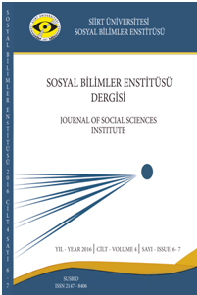THE ENIGMA OF ARRIVAL: BİR YERE AİT OLMA ÖYKÜSÜ
Bu çalışma V. S. Naipaul tarafından yazılan The Engima of Arrival adlı romanı bir yeri anlamlandırma çabası olarak incelemeyi amaçlamaktadır. Roman, otobiyografi ve kurgu karışımıdır. Dolaysısıyla, başkarakter aynı zamanda yazar Naipaul’dur. Roman, başkarakterin yazar olma çabasını anlatmaktadır. Başkarakter, ülkesi Trinidad’ın artık çürümekte olduğunu ve bir yazar için yeterli materyal bulundurmadığını düşünerek İngiltere’ye İngiliz edebiyatı okumaya gider. Ancak, İngiltere’yi umduğu gibi bulamaz ve hayal kırıklığına uğrar. Dickens ve Thackeray gibi yazarların romanlarında tasvir ettiği gibi büyük binalar bulmak yerine İngiltere’nin tıpkı kendi ülkesi gibi çürüdüğünü görür. Böylece, İngiltere’de yurtsuz ve depresif hisseder. Bu hislerinden kurtulmak için İngiltere’de yıllarca seyahat eder ve İngiltere’de yaşayan bazı İngilizlerin de tıpkı kendisi gibi yurtsuz hissettiğini görür. Daha sonra, İngiltere’nin Salisbury şehrinde bir kulübe kiralar ve orada insanların ve yerlerin çürümek yerine sürekli bir değişim ve akış içinde olduğunu gözlemler. Böylece, İngiltere’yi kendisine bir yurt adayı olarak görmeye başlar ve kendi kültürünü de reddetmeden İngiliz kültürüne uyum sağlamaya başlar.
Anahtar Kelimeler:
V. S. Naipaul, The Enigma of Arrival, yurtsuzluk, yabancılaşma, sömürgeleşme
THE ENIGMA OF ARRIVAL: A STORY OF BELONGING TO SOMEWHERE
This paper aims to analyze the novel The Enigma of Arrival by V. S. Naipaul as a story of making sense of place. The novel is a mixture of autobiography and fiction. Thus, the protagonist is Naipaul, the writer, and the novel recounts the protagonist’s attempt to become a writer. The protagonist moves to England to study English literature as he thinks that his native land, Trinidad is in decay and does not have valuable material to write about. However, he is disappointed with England because he cannot find England as he expects. Instead of finding grand buildings described in the novels of Dickens and Thackeray, he finds that England is in decay like his country. As a result, he feels displaced and depressed in England. In order to overcome these feelings, he travels for years in England and he realizes that not only himself as an ex-colonized living in ex-colonizer Britain but also English people feel displaced in their country. Then, he rents a cottage in a city in England named Salisbury where he observes that places and people are not in decay but in a constant change, and in flux. He learns to adapt England as a candidate to be his home and integrates himself into its culture without rejecting his own culture.
Keywords:
V. S. Naipaul, The Enigma of Arrival, displaced, alienation, colonization,
___
- Ali, S. and Gopal, A. (2013). Themes Prevalent in the Novels of V. S. Naipaul. The Criterion, An International Journal in English. Issue 12, (1-4).
- Ashcroft, B. and Griffiths, G. and Tiffin, H. (1989). The Empire Writes Back. London &New York: Routledge.
- Benoit, M. (2007). Cultural Representations: Stranger or Stranger? Displaced Identities in V. S. Naipaul. 3, (40-6).
- Gupta, S. (2014). Alienation and Rootlessness in the Novels of V. S. Naipaul. International Journal of English Language, Literature and Humanities. Volume II Issue, I, p. 306-13.
- King, B. (1993). Modern Novelists V. S. Naipaul. London: Macmillan.
- Levy, J. (1995). V. S. Naipaul Displacement and Autobiography. New York: Garland Publishing.
- Matthes, F. (2005). Beyond Boundaries? Emine Sevgi Özdamar’s MutterZunge and V.S. Naipaul’s The Enigma of Arrival as Creative Processes of Arrival”. Borders and Boundaries, eSharp Issue 5. 2005. http://www.encyclopedia.com/topic/V_S_Naipaul.aspx
- Naipaul, V. S. (1987). The Enigma of Arrival. England: Clays Ltd, St Ives plc.
- ISSN: 2147-8406
- Yayın Aralığı: Yılda 2 Sayı
- Başlangıç: 2013
- Yayıncı: Siirt Üniversitesi
Sayıdaki Diğer Makaleler
Mehmet Nezir ÇEVİK, Murat Gürkan GÜLCAN
OTHELLO’NUN BİR DOĞULU OLARAK PORTRESİ
YÜKSEKÖĞRETİMDE OTANTİK LİDERLİK DAVRANIŞLARININ ÖĞRENCİLERİN OKUL BAĞLILIKLARI ÜZERİNDEKİ ROLÜ
ÖRGÜTSEL ASiMiLASYON ÖLÇEĞi GELiŞTiRME: GEÇERLiK VE GÜVENiRLiK ÇALIŞMASI
Ümit ÇAĞATAY, Abdurrahman İLĞAN
ORTA ÇAĞ ORTA AVRASYA GÖÇEBELERİ ARASINDA DEĞİŞEN TÜRK KİMLİĞİ ALGILARI
19 MAYIS ATATÜRK’Ü ANMA GENÇLİK VE SPOR BAYRAMI’NIN ATATÜRK DÖNEMİ TÖRENLERİ: ADANA ÖRNEĞİ
Eğitimle İlgili İngilizce Kelimelerin Farsça Karşılıkları I
THE ENIGMA OF ARRIVAL: BİR YERE AİT OLMA ÖYKÜSÜ
